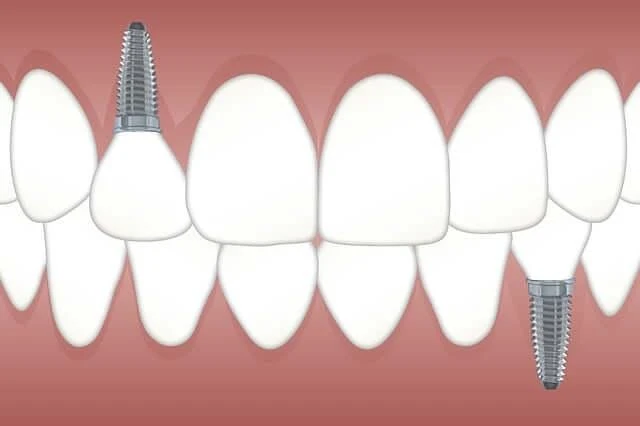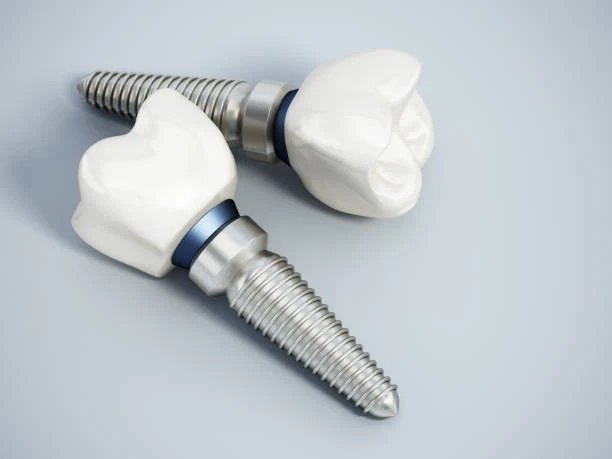Are you considering dental implants? Perhaps you’re wondering about the time it takes to complete the dental implant process. You’re not alone. Many people are curious about the timeline for this life-changing dental procedure.
In this article, we’ll delve into all aspects of dental implants, including the timeframes, types, materials, benefits, and aftercare. Understanding the entire process will help you decide if you want to proceed with this treatment.
Understanding Dental Implants
Dental implants are artificial tooth roots surgically placed into the jawbone. They provide a stable foundation for replacement teeth, such as crowns or dentures. Dental implants look and feel like natural teeth, making them a popular choice for individuals seeking a long-lasting solution for missing teeth.
Types of Dental Implants
Dental implants come in various types to suit different needs. The three primary types are:
Endosteal
These are the most common types of dental implants placed directly into the jawbone. They offer excellent stability and durability.
Subperiosteal
Subperiosteal implants sit on top of the jawbone but beneath the gum tissue. They are a suitable option for individuals with insufficient bone height.
Zygomatic
Zygomatic implants are longer and anchor into the cheekbone, making them ideal for those with severe bone loss.
Benefits of Dental Implants
Now that you know the basics, let’s explore the benefits of dental implants:
- Longevity: Dental implants can last a lifetime with proper care.
- Natural Look and Feel: They mimic real teeth in both appearance and function.
- Improved Speech and Eating: Dental implants allow for comfortable speaking and efficient chewing.
- Preservation of Jawbone: Unlike other options, implants stimulate bone growth and prevent deterioration.
- No Worries About Slippage: Dental implants stay firmly in place, unlike dentures.
The Dental Implant Process: Steps and Timelines

The dental implant process involves several key steps, each crucial to the success of your new smile. These steps typically include:
Consultation and Assessment
The journey begins with an initial consultation with your dentist. During this visit, your oral health will be assessed, and your dentist will discuss your treatment plan, including the estimated timeframe. This phase usually takes one to two weeks, including the preparation for the procedure.
Tooth Extraction (if needed)
In cases where a damaged tooth needs removal, this step precedes implant placement. Healing from the extraction may take two to three weeks.
Implant Placement
This is the pivotal step where the dental implant, often made of titanium, is surgically inserted into your jawbone. Healing and fusion with the bone, known as osseointegration, can take anywhere from 3 to 6 months.
Abutment Placement
After osseointegration, an abutment is attached to the implant. This piece connects the implant to the replacement tooth. This process needs two visits to the dentist, two weeks apart.
Crown or Denture Placement
The final step involves placing the custom-made crown or denture onto the abutment. This step is often the quickest, taking three weeks at most.
Remember, the duration of each stage in the dental implant process changes based on the quantity of implants and the procedure’s intricacy.
Aftercare of Dental Implants
Proper aftercare is vital to ensure the longevity of your dental implants. Your dentist will provide specific instructions, which may include the following:
- regular check-ups
- maintaining good oral hygiene
- avoiding excessive pressure on the implant site
Tips for Preparing for Dental Implant Surgery
Preparing for dental implant surgery is crucial for a successful outcome. Here are some tips to consider:
- Maintain Good Oral Hygiene: Healthy gums and teeth are essential.
- Quit Smoking: Smoking can hinder the healing process.
- Follow Pre-Operative Instructions: Your dentist will provide specific guidelines before surgery. Make sure to follow them.
Risks and Complications of Dental Implants
While dental implants are generally safe, like any medical procedure, they come with some risks and potential complications. These may include infection, nerve damage, or implant failure. However, the chances of complications are minimal with proper care and choosing an experienced dentist.
Trust Supremia Dentistry for your Dental Implants
If you’re considering dental implants and want a trusted and experienced team by your side, look no further than Supremia Dentistry. Our dental implant specialists are dedicated to providing top-quality care and ensuring your journey to a new smile is comfortable and successful.
Contact us today to schedule your consultation and take the first step towards a confident, healthy smile.
Conclusion

In conclusion, the duration of the dental implant process varies depending on individual factors and the specific steps involved. However, the benefits of dental implants, including their natural look, durability, and improved oral function, make them a worthwhile investment for your oral health and overall well-being.
FAQs
Can anyone get dental implants?
Most people are candidates for dental implants, but it depends on factors such as overall health and bone density. Consult with your dentist to determine if dental implants are right for you.
Is dental implant surgery painful?
Dental implant surgery is typically performed under local anesthesia, ensuring minimal pain during the procedure. Discomfort after surgery can be managed with pain medication prescribed by your dentist.
Are there dietary restrictions after getting dental implants?
While there are no strict dietary restrictions, avoiding very hard or sticky foods immediately after implant surgery is advisable.
Can dental implants set off airport metal detectors?
Dental implants are usually made of non-magnetic materials like titanium, so they should not set off airport metal detectors. However, informing security personnel about your dental implants before passing through the detectors is good practice
Can dental implants cause allergic reactions?
Allergic reactions to dental implant materials are exceptionally rare. Titanium, which is commonly used for dental implants, is biocompatible and generally well-tolerated by the body. If you have concerns about allergies, discuss them with your dentist before the procedure.

